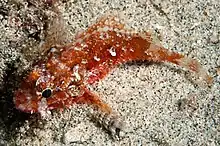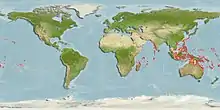| Parascorpaena mcadamsi | |
|---|---|
 | |
| An ocellate scorpionfish, Parascorpaena mcadamsi, in Bali, Indonesia, November 2012. Source: Andrey Ryanskiy / FishBase. License: CC by Attribution-NonCommercial | |
| Scientific classification | |
| Domain: | Eukaryota |
| Kingdom: | Animalia |
| Phylum: | Chordata |
| Class: | Actinopterygii |
| Order: | Scorpaeniformes |
| Family: | Scorpaenidae |
| Genus: | Parascorpaena |
| Species: | P. mcadamsi |
| Binomial name | |
| Parascorpaena mcadamsi (Fowler, 1938) | |
 | |
| AquaMaps (2019, October). Computer generated distribution maps for Parascorpaena mcadamsi (McAdam's scorpionfish), with modelled year 2050 native range map based on IPCC RCP8.5 emissions scenario. Retrieved from https://www.aquamaps.org. | |
| Synonyms[2] | |
| |
Parascorpaena mcadamsi, also called McAdam's scorpionfish, or most commonly the ocellate scorpionfish is a species of marine ray-finned fish belonging to the family Scorpaenidae, the scorpionfishes.[2] They are native to the Indo-Pacific with habitats ranging from the eastern coast of Africa to the western coast of North America, though they are most abundant in the East Indies.[3]
Description
The ocellate scorpionfish is a small species of scorpionfish, reaching about 8.0 cm in length. They generally have mottled brown, orange, and white scales with twelve dorsal spines, eight to nine dorsal soft rays, three anal spines, and five anal soft rays along with a quadrangular, naked depression behind the eyes. Ocellate scorpionfish also feature sexual dimorphism,[4] adult males will usually have a large black spot toward the rear of the dorsal fin between spines eight and ten. Females and juveniles will lack the spot or only feature a faint one.[5]
Behavior
Ocellate scorpionfish are generally more nocturnal, venturing out most often at night while remaining immersed within reefs during the day.[6]
References
- ↑ Motomura, H.; Matsuura, K. (2016). "Parascorpaena mcadamsi". IUCN Red List of Threatened Species. IUCN. 2016: e.T69798179A69800967. doi:10.2305/IUCN.UK.2016-3.RLTS.T69798179A69800967.en.
- 1 2 "Parascorpaena mcadamsi". Global Biodiversity Information Facility. Retrieved 7 May 2022.
- ↑ "Parascorpaena mcadamsi". fishesofaustralia.net.au. Retrieved 2022-05-06.
- ↑ Motomura, Hiroyuki; Paulin, Chris D.; Stewart, Andrew L. (2010). "First records of Scorpaena onaria (Scorpaeniformes: Scorpaenidae) from the southwestern Pacific Ocean, and comparisons with the Northern Hemisphere population". New Zealand Journal of Marine and Freshwater Research. 39 (4): 865–880. doi:10.1080/00288330.2005.9517358. ISSN 0028-8330. S2CID 59578270.
- ↑ "Ocellate Scorpionfish, Parascorpaena mcadamsi (Fowler, 1938)". The Australian Museum. Retrieved 2022-05-06.
- ↑ Froese, Rainer; Pauly, Daniel (eds.) (2022). "Parascorpaena mcadamsi" in FishBase. May 2022 version.
